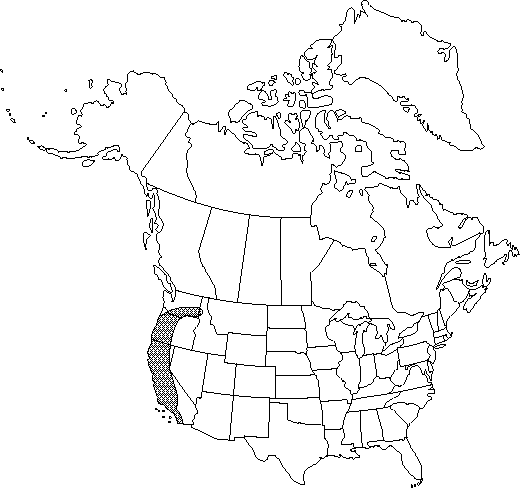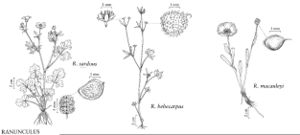familyRanunculaceae
genusRanunculus
subgenusRanunculus subg. Ranunculus
sectionRanunculus sect. Echinella
speciesRanunculus hebecarpus
Difference between revisions of "Ranunculus hebecarpus"
Bot. Beechey Voy., 316. 1838.
Illustrated
Treatment appears in FNA Volume 3.
FNA>Volume Importer |
imported>Volume Importer |
||
| (2 intermediate revisions by 2 users not shown) | |||
| Line 50: | Line 50: | ||
|publication year=1838 | |publication year=1838 | ||
|special status=Illustrated | |special status=Illustrated | ||
| − | |source xml=https:// | + | |source xml=https://bitbucket.org/aafc-mbb/fna-data-curation/src/2e0870ddd59836b60bcf96646a41e87ea5a5943a/coarse_grained_fna_xml/V3/V3_812.xml |
|genus=Ranunculus | |genus=Ranunculus | ||
|subgenus=Ranunculus subg. Ranunculus | |subgenus=Ranunculus subg. Ranunculus | ||
Latest revision as of 21:51, 5 November 2020
Stems erect, pilose. Basal and lower cauline leaf blades cordate-reniform, deeply 3-parted, 0.6-2.3 × 1.2-3.5 cm, segments undivided or 2-4-lobed, base shallowly cordate, margins entire or 2-4-dentate, apex of ultimate segments acute. Flowers pedicellate; receptacle glabrous; sepals 5, spreading, 1.1-1.8 × 0.5-1 mm, pilose; petals 0-5, 1.3-2 × 0.3-0.7 mm. Heads of achenes discoid, 4-6 × 3 mm; achenes 4-9 per head, 1.7-2.3 × 1.7-2 mm, faces and margin papillose, each papilla crowned with hooked bristle, otherwise glabrous; beak lanceolate, hooked distally, 0.5-0.7 mm.
Phenology: Flowering spring (Mar–May).
Habitat: Grasslands, open woodlands, and chaparral
Elevation: 50-900 m
Distribution

Calif., Idaho, Oreg., Wash., Mexico (Baja California).
Discussion
Ranunculus hebecarpus is native to western North America.
Selected References
None.
Lower Taxa
None.
